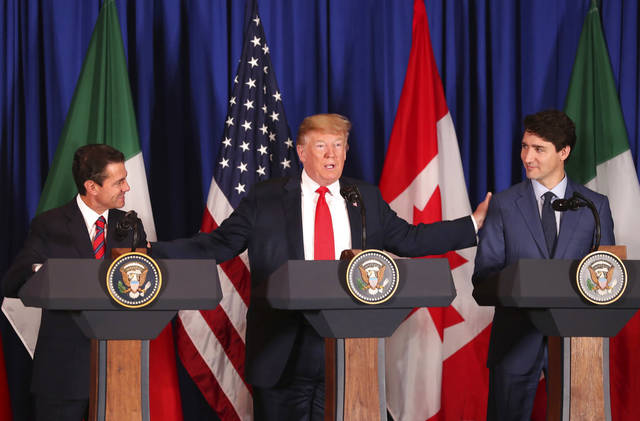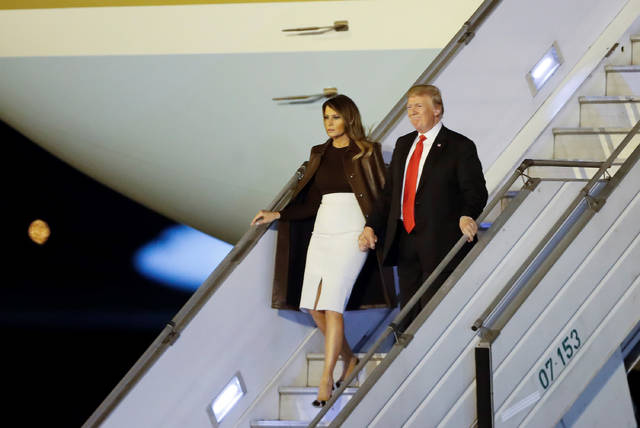BUENOS AIRES, Argentina — President Donald Trump and the leaders of Canada and Mexico signed a revision of the quarter-century-old North American Free Trade Agreement early Friday, but their ceremony did not disguise the tensions remaining or lessen the doubts of whether a new Congress would approve the pact.
At the event, on the sidelines of an international summit opening in Buenos Aires, Trump touted the hard-fought deal as “a truly groundbreaking achievement” and proudly held up the signed agreement for the cameras at the conclusion of a short ceremony. With Democrats taking control of the House in January, its passage through Congress remains uncertain, but the president professed confidently that he didn’t expect “much of a problem.”
Democrats have signaled they won’t support the deal without additional protections for workers, though it calls for some more safeguards than the agreement it would replace. The revised pact, which comes after a long, difficult negotiation, won’t replace NAFTA until it’s been approved by the legislatures of all three countries.
“Battles sometimes make great friendships,” Trump said, looking to put a positive gloss on his fraught relationship with Canadian Prime Minister Justin Trudeau.
But Trudeau, who considered not attending the ceremony that Trump was so eager for, refused to play along. He opted not to hold up the agreement to showcase the leaders’ signatures. Most notably, he refused during his brief remarks to refer to the agreement by the name that the brand-conscious Trump had given it — the United States-Mexico-Canada agreement, or USMCA, an acronym that Trump says recalls the title of a catchy hit of 40 years ago, “YMCA.”
“The new North American Free Trade Agreement maintains stability for Canada’s entire economy,” Trudeau said, using the name that dates to the early 1990s for the three nations’ accord, which Trump has been intent on repackaging as his own.
“That’s why I am here today,” Trudeau continued, saying the agreement “lifts the risk of serious economic uncertainty that lingers throughout a trade renegotiation process.”
Trump since his campaign had called NAFTA the worst trade deal in history, though much of it is carried over in the new version. The president falsely claimed the new deal was “the largest trade deal ever made” (the Trans-Pacific Partnership, from which he withdrew the United States, was larger), and asserted that it will lead to “high wages and higher wages” in the auto industry and bring back jobs that have been moved overseas.
Trump did not refer to General Motors’ recently announced plans to cut jobs at five American factories, four in the United States and one in Canada, but Trudeau did, calling it a “heavy blow.” He urged Trump to remove tariffs on Canadian steel and aluminum, which have been cited as a factor in GM’s decision to cut costs.
“Make no mistake, we will stand up for our workers and fight for their families and their communities,” he said, before addressing Trump directly. “Donald, it’s all the more reason why we need to keep working to remove the tariffs on steel and aluminum between our countries.”
Despite Trump’s hostile rhetoric about unauthorized immigrants crossing into the United States from Mexico, he appeared to be on better terms with that nation’s president, Enrique Peña Nieto, who was serving his final day in office — and, in Trump’s view, going out on a high note by signing the trade agreement.
“It really is an incredible way to end a presidency,” Trump said. “You don’t see that happen very often.”





Another Trump campaign promise kept. Imagine that.